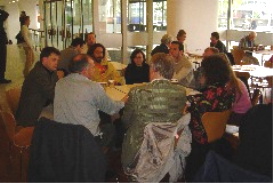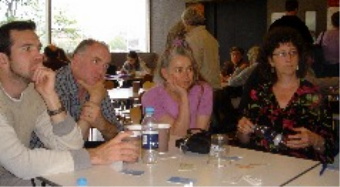Social Software ideas | A Whole Lotta Features
I have this love/hate affair with software features for online interaction. Goes to the previous post about our piling more garbage on that really does not go to the heart of the challenge. At the same time, I'm seduced by possibilities. Check out a few ideas Matt posted in December 2003.
Social Software ideas | A Whole Lotta Features: "While social software may be the internet revolution du jour among venture capitalists, as a user I'm still waiting for the killer social software app that lives up to all the market hype. Recently I've been thinking about how the current crop of options could be improved upon, or at the very least, how they could be leveraged to be something useful for users. I've come up with a few ideas, some half-baked, others fully baked. I offer them here in the hopes that someone, somewhere already built it or would like to build it."







